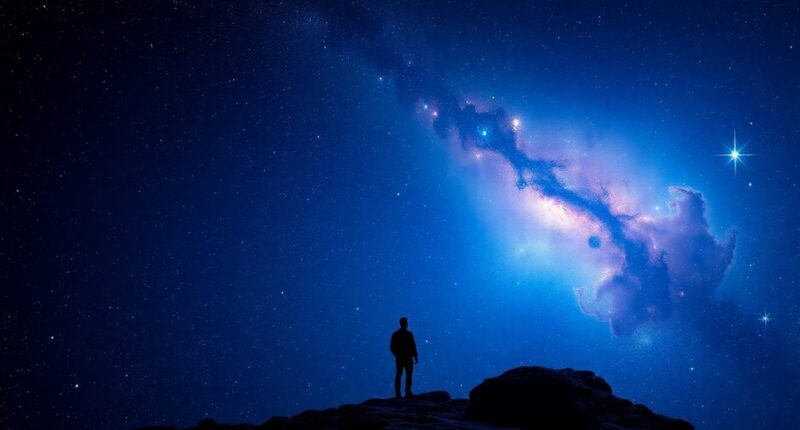If you loved *Interstellar*, there are plenty of mind-bending films to explore! Check out *Gravity* for its stunning visuals and survival themes, or *Arrival*, which uniquely tackles alien communication. *The Martian* showcases resilience in space, while *Solaris* dives into philosophical questions about emotions. Don’t miss *Sunshine* for its gripping storyline, or *Gattaca* for a thought-provoking look at identity. *Ad Astra* and *Contact* also provide profound journeys, each inviting deeper reflection into the cosmos.
Key Takeaways
- *Arrival* explores non-linear storytelling and emotional depth, highlighting human connection and the complexities of communication with extraterrestrial life.
- *Gravity* combines stunning visuals with survival themes, showcasing the psychological tension faced in isolation while navigating the challenges of space.
- *Solaris* delves into human emotions and identity through grief, raising profound questions about reality and the essence of being human.
- *Blade Runner 2049* examines identity and existence, blurring the lines between artificial and authentic life through its visually striking narrative.
- *Ad Astra* presents a psychological journey of self-discovery against cosmic challenges, emphasizing themes of isolation and family dynamics in a visually captivating setting.
Gravity: A Visual Masterpiece of Survival in Space

When you watch “Gravity,” you’re not just seeing a film; you’re experiencing a visual masterpiece that immerses you in the vastness of space.
Created predominantly by Framestore, around 80% of the film relies on CGI, showcasing breathtaking visuals. The innovative lightbox rig, with its 1.8 million individually controlled LED lights, simulates the unique lighting of outer space, enhancing the film’s realism. This collaboration with Bot & Dolly and an on-set special effects team brought to life the film’s stunning visuals through advanced technology.
You’ll feel the tension of survival as two astronauts navigate isolation and existential dilemmas in a stunningly depicted void. The meticulous planning and robotic camera movements simulate zero-gravity, pulling you deeper into the experience.
“Gravity” redefines cinematic storytelling, blending scientific accuracy with emotional depth, setting a new standard for future space films.
Arrival: An Introspective Take on Alien Encounters

As you delve into *Arrival*, you’re invited to reconsider the nature of communication and the complexities of human emotion through the lens of an alien encounter.
The film centers on Dr. Louise Banks, a linguist, and physicist Ian Donnelly, who work to decipher the heptapods’ intricate language composed of circular symbols. Their initial contact across a barrier sets off a global response, highlighting the challenges in understanding these extraterrestrial beings. During their efforts, Dr. Banks is sought out for her expertise by the US Army Colonel Weber to assist in deciphering the alien language.
Through non-linear storytelling, you experience the profound emotional depth of time perception and personal sacrifice. The heptapods’ message ultimately fosters global cooperation, urging humanity to unify in deciphering their intent.
With its atmospheric cinematography and thought-provoking themes, *Arrival* stands as a significant exploration of alien encounters and human connection.
The Martian: Problem-Solving and Resilience on Mars

Exploring the vastness of space reveals not only the mysteries of the universe but also the resilience of the human spirit.
*The Martian*, directed by Ridley Scott, exemplifies this as it follows astronaut Mark Watney, who’s stranded on Mars after a failed mission. You see Watney’s scientific ingenuity as he grows a garden using Martian soil and bio-waste. Resourcefully, he transforms leftover rocket fuel into water, showcasing his problem-solving skills. His ability to improvise tools and assess risks keeps him alive in a hostile environment. Even in isolation, Watney maintains mental stability through humor and routine. His determination to survive fuels his resilience, reminding you that hope and perseverance can overcome even the most daunting challenges, a theme that resonates with the film’s portrayal of NASA’s rescue efforts.
Solaris: A Philosophical Exploration of Human Emotions

Though set in the vastness of space, *Solaris* delves deep into the intricacies of human emotions, challenging you to ponder the very nature of reality.
As Dr. Chris Kelvin navigates a desolate space station, you witness how grief and guilt manifest when replicas of loved ones appear. The situation escalates as the station faces destruction, leading to Kelvin’s realization about his existence.
Through his haunting relationship with the replica of his deceased wife, Rheya, the film explores complex themes of identity and connection.
You’re prompted to question the essence of being human and the ethical implications of artificial life.
The psychological impact on the crew reveals how memories shape our perceptions, forcing you to confront your own emotional depth and the fragile boundaries between love, loss, and existence in this thought-provoking sci-fi masterpiece.
Interstellar: A Mind-Bending Journey Through Time and Space

In a world teetering on the brink of collapse, *Interstellar* takes you on a mind-bending journey through time and space that challenges your perceptions of love, sacrifice, and survival.
You follow Cooper, a former NASA pilot, as he embarks on a daring mission to find a habitable planet through a wormhole. The film’s stunning visuals and scientifically accurate depictions of black holes and time dilation create an immersive experience. The narrative’s exploration of time dilation serves as a key element, illustrating the emotional impact of time on relationships and survival.
As you navigate the non-linear storytelling, you’ll feel the emotional weight of the characters’ struggles. The haunting score intensifies the tension and further connects you to their plight.
Ultimately, *Interstellar* explores the depths of human emotion against the vastness of the cosmos, leaving you questioning your own existence.
Blade Runner 2049: A Futuristic Exploration of Humanity

As you dive into *Blade Runner 2049*, you’re transported to a visually stunning dystopian future that raises profound questions about humanity and existence.
You follow K, a Nexus-9 replicant, as he uncovers a buried secret: a replicant who died during childbirth, suggesting they can reproduce. This revelation threatens the delicate balance between humans and replicants, igniting potential conflict.
K’s journey forces him to confront his identity, blurring the lines between artificial and authentic memories. The film challenges the ethics of creating sentient beings while exploring themes of rebellion and freedom through the replicant rights movement. Additionally, it won Academy Awards for Best Cinematography and Best Visual Effects, highlighting its artistic achievements.
With breathtaking visuals and complex characters, *Blade Runner 2049* immerses you in a world that profoundly questions what it means to be human.
Sunshine: Sacrifice and Survival Among the Stars

*Sunshine* takes you on a gripping journey through the dark void of space, where a team of astronauts embarks on a desperate mission to reignite the dying Sun.
Set in 2057, you follow Capa, Searle, and Corazón as they travel towards the Sun, armed with a massive nuclear fission bomb. The stakes are high; with the loss of their captain and the oxygen garden, survival hangs by a thread. As isolation takes its toll, you’ll feel the intense psychological tension and existential dilemmas the crew faces.
The film masterfully blends stunning visuals and an evocative soundtrack, immersing you in themes of sacrifice and human resilience. In a moment of desperation, the crew must confront the distress call from Icarus I, which adds a layer of urgency to their mission. It’s a haunting exploration of humanity’s struggle against the vastness of the universe.
Gattaca: Identity and Fate in a Genetic Society

Exploring the depths of human potential, *Gattaca* presents a future where genetic engineering dictates one’s place in society. You’ll find Vincent Freeman, a naturally born individual, fighting against a system that marginalizes people like him. The film dives into themes of identity as Vincent assumes the persona of Jerome Eugene Morrow to chase his dream of space travel. It raises profound questions about fate versus free will, challenging whether genetics truly define one’s destiny. Through Vincent’s perseverance, you witness the human spirit’s resilience against societal norms. Relationships, like those between Vincent and his brother Anton or Irene, explore love’s power to defy genetic expectations. Ultimately, *Gattaca* critiques a world obsessed with genetic superiority, urging you to reflect on identity and ambition. Additionally, the film’s depiction of genoism and eugenics has sparked important conversations about the ethics of genetic discrimination in society.
Ad Astra: A Psychological Adventure in Space Exploration

Set against the backdrop of a near-future Earth threatened by mysterious power surges, *Ad Astra* takes you on a psychological journey through space and self-discovery.
You follow Major Roy McBride as he embarks on a mission to find his estranged father, H. Clifford McBride, and uncover the truth behind the Lima Project’s fate. This film delves into themes of isolation and family dynamics, forcing you to confront existential questions about humanity’s role in the universe.
As stunning visuals and immersive cinematography enhance your experience, you feel the weight of Roy’s solitude and emotional struggles. Notably, the film grossed over $135 million worldwide, showcasing its impact beyond the critical reception.
Ultimately, Roy’s return to Earth isn’t just about retrieving data; it signifies a profound transformation in his understanding of self and legacy.
Contact: The Implications of Extraterrestrial Communication

While *Ad Astra* takes you on a personal journey through space, *Contact* expands that exploration to the vast possibilities of communication with extraterrestrial life.
This film delves into SETI and METI efforts, showcasing the challenges and ethical dilemmas of reaching out to unknown civilizations. You’ll see how messages often rely on universal math and science, but deciphering alien languages poses significant hurdles, especially considering that universal principles of math and science are a common ground in initial attempts at communication.
The implications of first contact are profound—cultural shifts, scientific advancements, and the need for a unified global response come into play.
As you ponder the risks of engaging with potentially hostile entities, you’ll recognize that the quest for communication is as much about understanding ourselves as it’s about understanding others.
Frequently Asked Questions
What Are the Common Themes in These Sci-Fi Films?
In sci-fi films, you’ll often notice themes like human resilience in extreme conditions, the ethical dilemmas surrounding technology and artificial intelligence, and the complexities of time travel.
These movies explore existential risks in space, the impact of technological advancements, and the challenges posed by cosmic phenomena.
You’ll also find narratives that dive into alternate realities and dystopian futures, prompting thought-provoking questions about identity, survival, and the consequences of innovation.
How Do Visual Effects Enhance the Storytelling in These Movies?
Visual effects enhance storytelling by immersing you in the film’s world, making the impossible feel real. They create emotional depth, like in “Arrival,” where VFX illustrate complex concepts, pulling you into the narrative.
In “Gravity,” the stunning visuals amplify feelings of isolation and survival. By blending art and science, movies can convey themes and emotions that resonate, ensuring you stay engaged and invested in the characters’ journeys throughout their cosmic adventures.
What Philosophical Questions Do These Films Raise About Humanity?
Films like *Interstellar* raise profound philosophical questions about humanity’s purpose, survival, and identity.
You’re prompted to contemplate your role in the universe and the ethical implications of exploration.
These narratives challenge you to reflect on hope, love, and the duality of human nature. They also explore fate versus free will, pushing you to consider how your choices shape your existence and the responsibilities you hold in a vast, interconnected cosmos.
Are There Any Notable Directors Behind These Films?
When you dive into the world of captivating cinema, you can’t help but notice the maestros behind these masterpieces.
Directors like Alfonso Cuarón, known for *Gravity*, and Ridley Scott, who brought *The Martian* to life, showcase their unique visions.
Christopher Nolan’s intricate storytelling in *Interstellar* and Denis Villeneuve’s thought-provoking *Arrival* also stand out.
Each of these talented directors crafts unforgettable narratives that resonate deeply, making their films truly remarkable experiences.
How Do These Films Compare to Classic Sci-Fi Cinema?
When you compare these films to classic sci-fi cinema, you’ll notice they push visual and narrative boundaries further than ever.
They blend groundbreaking cinematography and sound design with complex themes, like existential questions and human emotion.
You’ll find that they often incorporate real scientific concepts, making the stories feel more grounded.
Conclusion
As you journey through these cinematic gems, let your imagination soar like a spaceship gliding past distant stars. Each film invites you to unravel the mysteries of existence, whether it’s battling the void of space or confronting the depths of human emotion. So grab some popcorn, dim the lights, and prepare for a mind-expanding adventure that’ll leave you pondering the universe long after the credits roll. These stories remind us that the cosmos is both vast and intimately connected to us.









